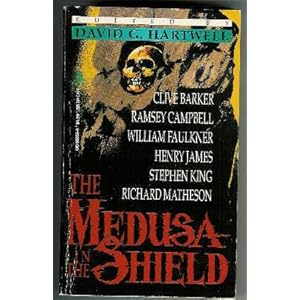****
Another collection of, by and large, excellent stories. This volume highlights horror from a psychological perspective--the events are not objectively horrifying, but horrifying in their effect on the human psyche. Here, fear is fear not because of what is outside, but because of how it is perceived by the human mind. Even the seemingly mundane can thus be rendered horrific if viewed through the eyes of one who fears it. And conversely, scary events lose their ability to terrify us if the characters in the story are utterly unaffected by the horrors that surround them.
The psychological focus is fodder for a much more highbrow treatment of horror, and the editor was able to pull from several authors who have garnered much more respect in the literary world. Thus, in addition to entries by popular writers like Stephen King, Clive Barker, and Richard Matheson (of the modern era) and Lovecraft and Le Fanu (from times past), Hartwell includes stories penned by such literary heavyweights as William Faulkner, D.H. Lawrence, Flannery O'Connor, Edgar Allen Poe, and Henry James.
Somewhat surprisingly, these bigwigs of the writing world did not necessarily produce the best stories in the collection. I was not terribly impressed by "The Fall of the House of Usher" (sorry, Poe--you know I love you, and I know this story is supposed to have been foundational for lots of other writers, but I didn't think it was a great story), and I had a heck of time slogging through "The Jolly Corner" (Henry James' credentials notwithstanding). But there were some definite gems in here. "The Roaches" was gross and creepy, "Bright Segment" was chilling, "Dread" was disturbing, "Good Country People" was depressing, and "The Monkey" was, if a little trite, still unsettling.
I really enjoyed "The Rocking-horse Winner" and "Three Days", though I'm not sure why they qualify as horror as opposed to merely otherworldly. Both stories had quite likable, even noble protagonists and were, in their way, sad and rather sweet.
All in all, I continue to be impressed with the collection of stories Hartwell has amassed. To the extent that his goal is to convince his readers that horror is a worthwhile and significant genre (and not just the stuff of insipid and talentless slasher films), he most definitely succeeds.

No comments:
Post a Comment